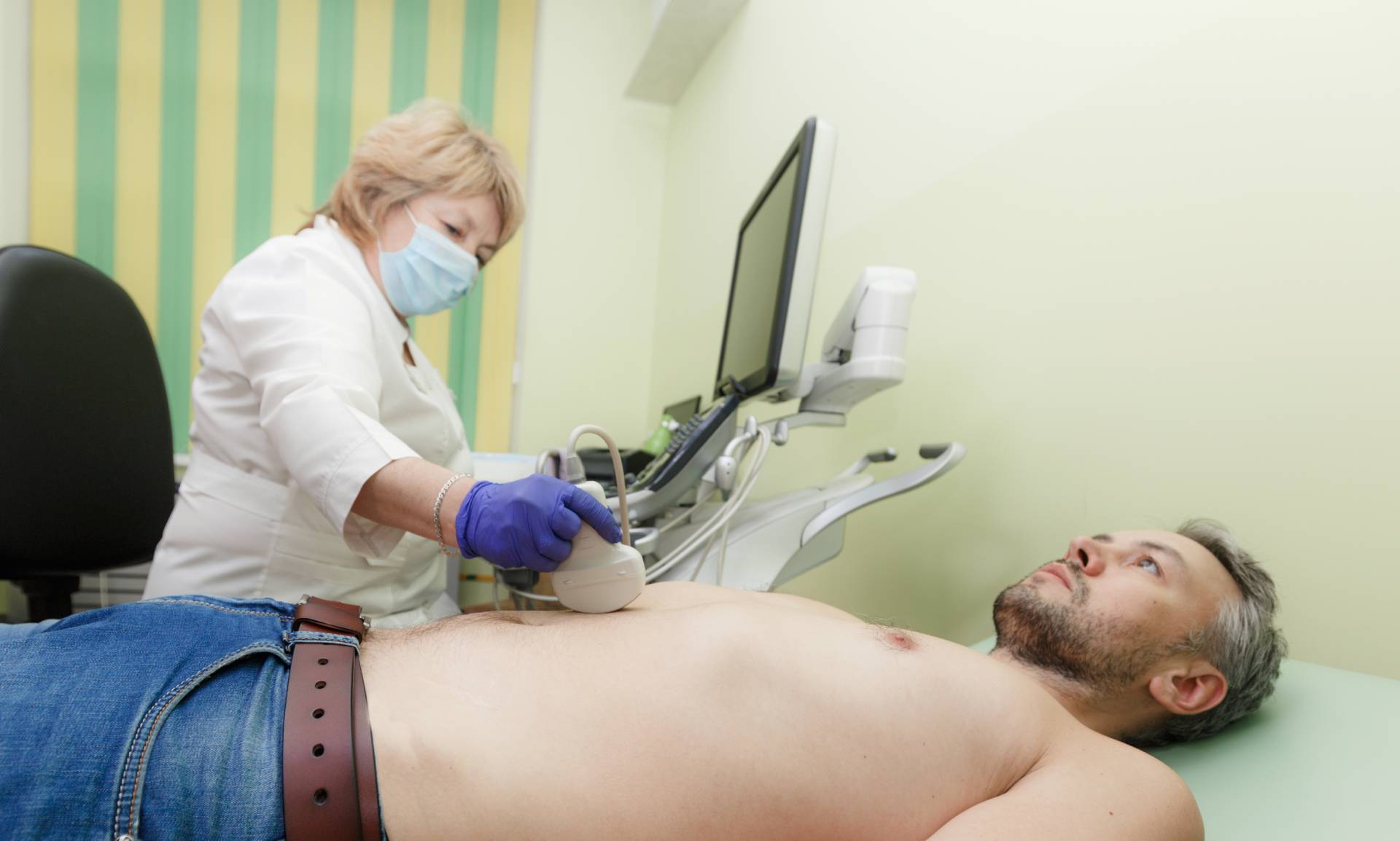FibroScan® in St. Louis, MO
What is FibroScan?
FibroScan is a method used by Specialists in Gastroenterology providers to noninvasively check the liver. Also known as transient elastography, the elastography technology uses a specific ultrasound technology to evaluate the state of fibrosis and steatosis inside the liver. Fibrosis occurs when the liver exchanges sound tissue with scar tissue in an attempt to remedy itself from some other condition. Hepatic steatosis is also identified as fatty change and develops when fat builds up inside the liver cells.
Using FibroScan, your St. Louis, MO GI specialists will be able to analyze the state and working condition of your liver and provide a diagnosis and treatment plan without intrusively entering the body to assess the liver. If you have a liver issue, request a consultation at a Specialists in Gastroenterology location in your community to see if you could benefit from FibroScan ultrasound technology.

Who is a candidate for FibroScan?
FibroScan analysis may be useful for patients with early to progressive liver disease or other liver conditions. These can include:
- Hemochromatosis
- Nonalcoholic steatohepatitis (NASH)
- Cirrhosis of the liver (extreme scarring)
- Different types of CLD (chronic liver disease)
- Syndrome X (insulin resistance syndrome)
- Certain types of hepatitis
- Primary biliary cholangitis (PBC)
- Alcoholic FLD
How is FibroScan performed?
A FibroScan exam in St. Louis, MO is usually a quick procedure that is finished within 10 – 15 minutes. A detector will be placed on your skin right next to your liver. This distinctive detector radiates acoustic sound waves through your liver to evaluate the speed at which sound crosses through the organ. The FibroScan technology then creates a group of outcomes that your Specialists in Gastroenterology providers will put to good use to analyze the extent of scarring (fibrosis) exhibited within your hepatic system (liver).
How do you understand and interpret FibroScan results?
FibroScan results are given in accordance with fatty liver disease (steatosis) grade and fibrosis score. The following charts are comprised of generic information relating to what the outcome of the scan may indicate. You can review your findings in detail with your Specialists in Gastroenterology provider after your FibroScan test.
Steatosis grade of severity: The fatty change findings show the level of steatosis in the liver and are delivered through a CAP score (controlled attenuation parameter), which is measured in dB/m (decibels per meter). The reach is from 100 to 400 dB/m, and diverse ranges contribute to various fatty liver grades.
Fibrosis score: The fibrosis end result is a valuation of the stiffness of the liver and represents the extent of scarring that the liver has experienced. Your gastrointestinal specialists will use your FibroScan findings and your medical history to determine your fibrosis score. Different liver diseases and conditions can impact the fibrosis score.
F0 to F1: void of scarring/minimal scarring
F2: medium scarring
F3: Severe scarring
F4: Advanced scarring (cirrhosis)
What are the benefits of a FibroScan?
Because FibroScan uses ultrasound technology, there is little to no danger linked with the treatment. FibroScan is a non-invasive ultrasound technique and for that reason is quite comfortable. It allows for a bigger inspection of the entire liver instead of viewing a small portion with a liver biopsy. No sedation medication is required for this exam, it is relatively inexpensive, quickly accomplished, and the results are swift.

Specialized care for liver conditions
FibroScan® FAQs
How should I prepare for the FibroScan exam?
You will be instructed not to drink or eat anything leading up to your FibroScan procedure. It is okay, however, to take your medications as normal. Our GI doctors recommend that you dress in loose and comfortable clothes to make it easier for your provider to access the right side of your ribcage.Your GI doctor will discuss all these details with you prior to the visit so you know and understand what you can expect before, during, and after a FibroScan test.
What diseases of the liver can FibroScan evaluate?
The FibroScan test can uncover and monitor the progression of a range of liver conditions, including:
- Non-alcoholic fatty liver disease (NAFLD)
- Alcoholic liver disease
- Non-alcoholic steatohepatitis (NASH)
- Hepatitis B or C
- Hemochromatosis
What is the difference between an ultrasound and the FibroScan?
FibroScan is actually a kind of ultrasound and uses the same technology a typical ultrasound uses, called transient elastography. Although the two are very similar, FibroScan was developed to measure the stiffness of the liver and, therefore, is much more accurate in discovering issues within the liver than a standard ultrasound.
Is FibroScan better than a liver biopsy?
The FibroScan is an excellent nonsurgical and minimally invasive option to the biopsy of the liver. It should be noted, though, that there may be certain instances when a biopsy of the liver might be ideal. This could be the case for a patient who has a pacemaker or defibrillator, is pregnant, or has fluid in the abdomen. Results could be inaccurate in people who are morbidly obese. For these reasons, our Specialists in Gastroenterology providers will work closely alongside you to determine if this test or a traditional liver biopsy is better for your needs.
